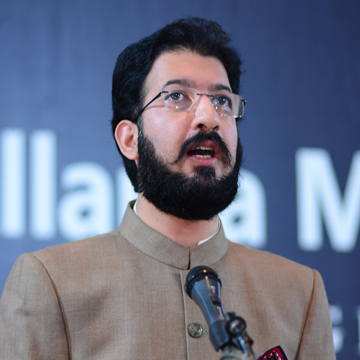
|
|
Sahibzada Sultan Ahmed Ali
Dewan of Junagadh State & Chairman MUSLIM Institute
Opening Remarks
|
| |
|
Allama Muhammad Iqbal laid philosophical and ideological foundation of the Pakistan Movement. His message was so strong and effective that in no time, it became a torchbearer for Muslim League that led to the demand of a separate Muslim state in form of 1940’s Pakistan Resolution. Dr. Allama Iqbal asserted in “The Reconstruction of Religious Thought in Islam” that there is no bifurcation in the unity of man into an irreconcilable duality of spirit and matter. This philosophy echoes equally in his academic work as well as in the historic address delivered at the annual meeting of the All-India Muslim League in 1930 at Allahabad. He presented the idea of a separate state as the destiny of Muslims of India. In Allama Iqbal's famous poem Masjid-e-Qurtaba, Cordoba Mosque refers to Pakistan and the word ‘man of faith’ refers to Quaid-e-Azam.
|
|
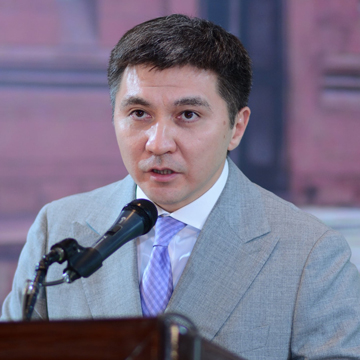
|
|
His Excellency Yerzhan Kistafin
Ambassador of Kazakhstan to Pakistan
Guest of Honour
|
| |
|
First of all, thanks to Sahibzada Sultan Ahmed Ali for his kind invitation. Iqbal is a great thinker of all times. He highlighted the importance of the Central Asian region to promote trade and communication. The philosophy of Iqbal remains still relevant in this case. We are working to establish a direct connection of Central Asia with Pakistan. Iqbal was one of the philosophers who studied the culture of Central Asia and paid special attention to Farabi, Rumi and others, which shows how our thinkers are connected. Honestly, the more I read Iqbal the more I am convinced about his knowledge. Nowadays, we are working to have collaboration with Pakistan not only in trade and communication but also at the university level. In collaboration with our cultural ties with the country, we would like to build a connection between Lahore and Turkistan. Next year, we will be celebrating the 145th anniversary of Iqbal which will be another initiative for further strengthening relations between the two brotherly states.
|
|
|
|
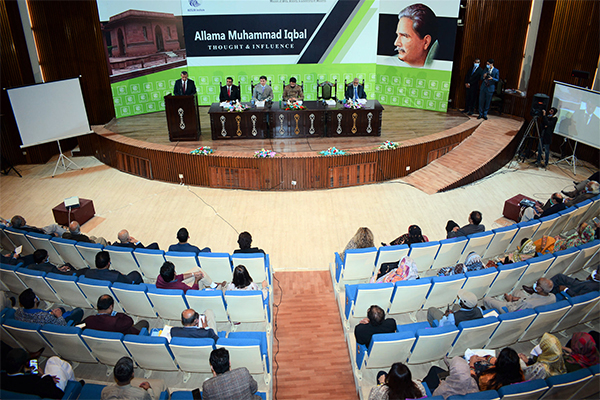
|
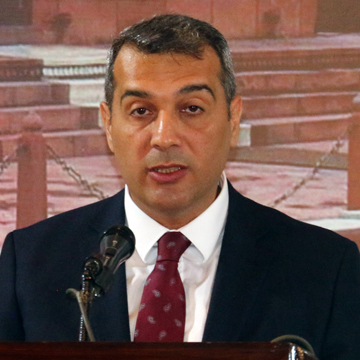
|
|
His Excellency Khazar Farhadov
Ambassador of Azerbaijan to Pakistan
Guest of Honour
|
| |
|
Paying tribute to Iqbal as a recognized writer, poet, researcher, and genuine visionary demands us to recall his message of self-awareness and self-esteem. Iqbal focused on issues such as significance of life, opportunity, consciousness, determination, endurance, progress, connection between body and soul, reason and feelings and other such matters that defined best personalities of mankind. Allama Muhammad Iqbal led Muslims at every step and considered Islam a complete code of life. He clarified the glorious image of Muslim Ummah and wrote several poems. Iqbal and his writings transcend the boundaries of South Asia and find great respect, particularly in Azerbaijan in form of a recent translation of Iqbal’s famous seven-lecture book “The Reconstruction of Religious Thoughts in Islam” including research on Iqbal and his works.
|
|
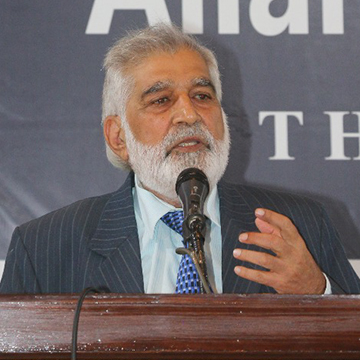
|
|
Dr. Talib Hussain Sial
Former Director Iqbal International Institute for Research & Dialogue, International Islamic University, Islamabad
Guest of Honour
|
| |
|
Iqbal remains relevant even after the 20th century as a source of knowledge. His famous seven lectures show that Iqbal was well versed in both the eastern and the western world. Including his twenty-five contemporaries, Iqbal mentions the contributions of thirty-five western scholars, mathematicians, and scientists. Iqbal also points to the works of fifteen Muslim thinkers and philosophers with the references of their books. As an avid reader, Iqbal read Eastern and Western philosophy extensively but his source of inspiration had always been Quran as he quoted 127 verses in his 7 lectures. Besides, Iqbal published his first work on economics named “Ilm –ul- Iqtisad. Iqbal had predicted a new world for Muslims when he visited Cordoba Mosque in Spain. His prediction proved to be true as multiple Muslim states were liberated from western colonialism.
|
|
|
|
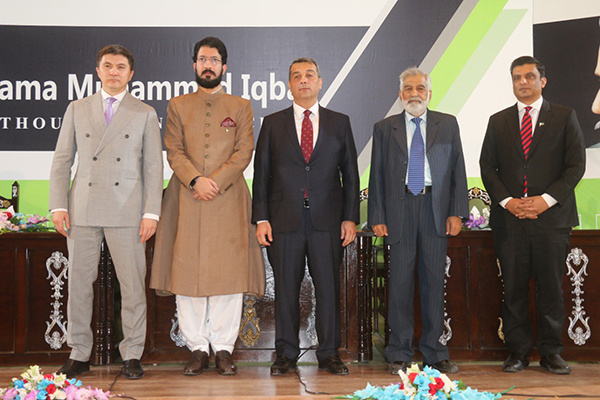
|
|
Prof. Dr. Safeer Awan (Pro-Rector NUML, Islamabad) chaired the academic session of the Seminar. Sahibzada Sultan Ahmed Ali (Dewan of Junagadh State & Chairman MUSLIM Institute) delivered the vote of thanks. Distinguished speakers included Prof. Dr. Aalia Sohail Khan (Former VC Rawalpindi University), Prof. Dr. Muhammad Jaleel Aali (Writer, Poet, and Critic), Prof. Dr. Ayub Sabir (Writer and Analyst), Mr. Salahuddin Choudhry (Former Ambassador of Pakistan). Mr. Sami Ur Rehman (Assistant Professor of Law, NUST University) moderated the proceedings of the session.
|
|
|
|
|
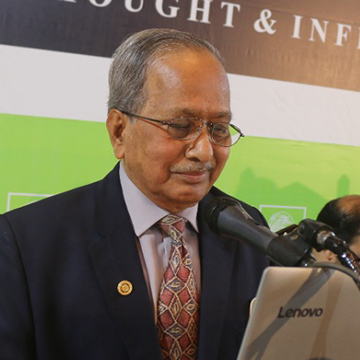
|
|
Mr. Salahuddin Choudhry
Former Ambassador of Pakistan
Allama Iqbal and Shakespeare
|
| |
|
Allama Iqbal is known to have paid glowing tributes to some men of letters in his first Urdu book of poetry 'Bang-e-Dara', including Ghalib, Shibli, Hali, and William Shakespeare. Allama Iqbal and Shakespeare are recognized as the world's giant literary figures. Allama Iqbal is a universal poet and revered as poet-philosopher because his poetry was not just lyricism; singing the songs of beauty and love but also the destiny of his nation. Perhaps the genius of Iqbal and Shakespeare lies partly in the possibility that they were no strangers to the general public. The poem titled 'Shakespeare' is written in sonnet format of Shakespearean time which Allama Iqbal greatly admired.
|
|
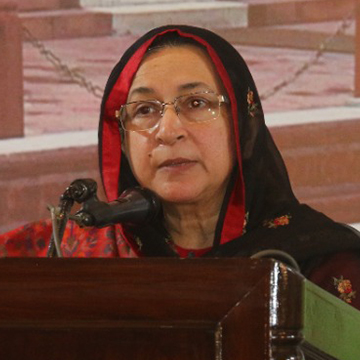
|
|
Prof. Dr. Aalia Sohail Khan
Former Vice chancellor, Rawalpindi Women University
Iqbal’s Poetry: The Prime Motivational Force Behind the Pakistan Movement
|
| |
Iqbal believed that if Muslims get helpless or frustrated, they can use their will to overcome this and can attain their destiny. He saw, in Muslim history, spiritual energy that could energize Muslims to re-emerge. He looked at history as a mirror that reflects the true spirit of Muslims and therefore, he created a gallery of heroes like companions of Holy Prophets, pious persons, freedom fighters, and generals. This serves a two-fold psychological purpose. Iqbal wanted Muslims to develop self-confidence and their lost self-respect. He also looked at history as a teacher. He said, “Read the lesson of truth, bravery, and justice”. So, we should follow the footsteps of the Holy Prophet (SAWW), the right example of bravery, courage, determination, sacrifices, integrity of character, and then
کی محمد سےوفا تونے توہم تیرے ہیں
یہ جہاں چیزہےکیالوح وقلم تیرے ہیں
|
| |
To my Muhammad, be true and you have conquered me;
The world is nothing you will command My Pen of Destiny.
|
This is Iqbal’s message and this helped the Muslims of India to achieve Pakistan.
|
|
|
|
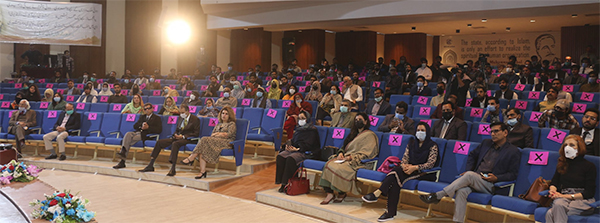
|
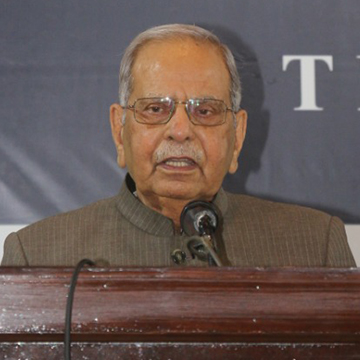
|
|
Prof. Dr. Ayub Sabir
Writer and Analyst
Idea of Pakistan in Iqbal’s Letters to Jinnah
|
| |
|
Disappointed with One-Nation Theory, Quaid-e-Azam Muhammad Ali Jinnah adopted Allama Iqbal's view of a separate nationalism of Muslims, which was later renamed as Two-Nation Theory. The importance of the letters written by Allama Iqbal to Quaid-e-Azam can be gauged from the fact that when these letters were published in the form of a book, Quaid-e-Azam wrote its preface. Regarding these letters, Quaid-e-Azam writes that these letters are of great historical significance, especially the letters which were written about the political future of India and that of the Muslims. The first Iqbal Day which was celebrated after the death of Allama Iqbal was presided over by Quaid-e-Azam and he wished that when a new state is formed it should be established according to Iqbal's ideas. Allama Iqbal and Quaid-e-Azam have spoken about Islamic civilization and both of them emphasized justice, welfare, and eradication of poverty.
|
|
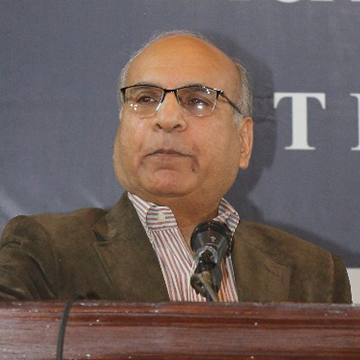
|
|
Prof. Dr. Muhammad Jaleel Aali
Writer, Poet & Critic
Islamic Ideological State in Iqbal’s Poetry
|
| |
|
Allama Iqbal observed the concept of nationalism in Europe while living there. Iqbal was an ideological man, so the basic conflict between him and this ideology was that humans established such a large institutional state, based either on race and colour or only on geography or an ethnic group. If such a large unit or country is built for human habitation then there must be some social contract that should be ideological. From there, Iqbal began to think that the state should be ideological as ideology is what is open to all. The concept of Pakistan and the Two-Nation Theory is the result of Allama Iqbal's pain for the whole of humanity, a universal ideological concept, the solution of which Iqbal derived from Islam. Iqbal studied all religions, he found universality in Islam.
|
|
|
|
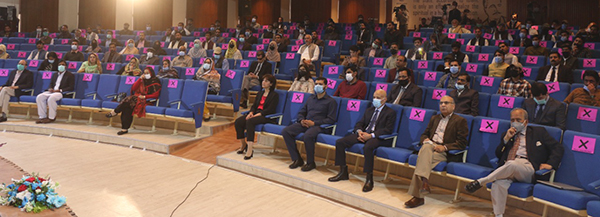
|
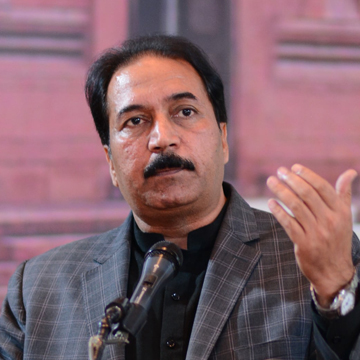
|
|
Prof. Dr. Safeer Awan
Pro-Rector National University of Modern Languages, Islamabad
Remarks by Chair
|
| |
Interesting thing is that Iqbal has everything; he has something that is for everyone. If you want to be a revolutionary then he would tell you:
"Rise and awaken the poor people of my country"
He would also tell you about Iblees’s (Satan) message in a strange way. So, whatever you want to do, you would find a message in Iqbal’s thinking. If you want to be a revolutionary, mystic and ideological citizen, Iqbal urges you to explore this world:
بے ذوق نہیں اگرچہ فطرت
جو اس سے نا ہو سکا تو کر
|
Though nature is an artist of skill;
Do thou what it has left undone
|
According to Iqbal, leadership is only for those, who are working for humanity. Therefore, we need to evaluate what is our contribution to humanity. You shall have to invoke Iqbal’s book, "The Reconstruction of Religious Thoughts in Islam"
His all books invite us for deep thinking, self-recognition and philosophy, which are the need of the hour. He also composed poems relating to modernism to reshape our thoughts.
|
|
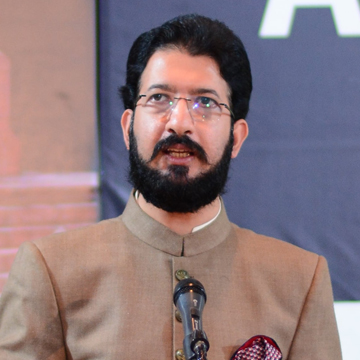
|
|
Sahibzada Sultan Ahmed Ali
Dewan of Junagadh State & Chairman MUSLIM Institute
Vote of Thanks
|
| |
|
I believe that only a great thinker can lead you to a great path. It is an ancient Greek proverb, "Philosophy is a great giant and a human is a dwarf but if the dwarf stood on the shoulder of the giant, he could have a greater distant view.” If you had such an unprecedented personality, he could solve all your problems. To us, solutions to issues of Pakistan and Muslim-Ummah lie in Allama Muhammad Iqbal’s thought. Amongst all 20th century thinkers, Allama Iqbal pondered more on the issues of Muslim-Ummah and came up with more solutions as compared to his contemporaries. Meer Taqi Meer and Mirza Asadullah Khan Ghalib were the great poets of the 18th and 19th century respectively and Allama Muhammad Iqbal was the greatest poet of the 20th century. If we choose the five most sublime poems of Urdu literature, all five will belong to Allama Muhammad Iqbal only.
|
|
|
|
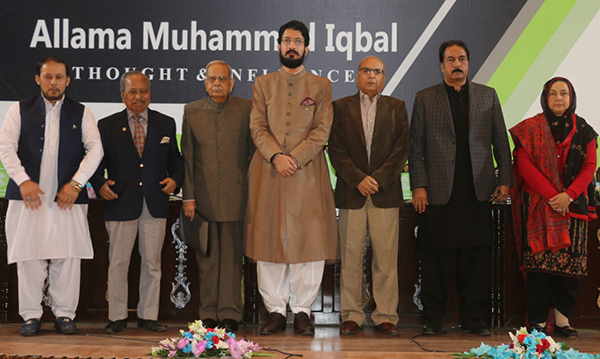
|
|
© 2021. All rights reserved.
|
|
|
|
|
|
|
| | | |